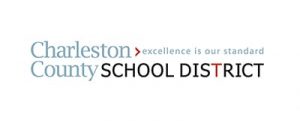CCSD honored by state for reducing energy consumption
April 11, 2019Charleston Country School District (CCSD) staff, at both the school and district level, constantly research and implement steps to reduce energy costs and consumption. These actions led to a state-level recognition, as CCSD was honored at the Association of South Carolina Energy Managers Conference today at Spirit Communications Park in Columbia for reducing “energy intensity” by 20 percent since the year 2000; it is called the 20% by 2020 Award.
Ten entities, including eight school districts, were honored at the conference.
“It should be made clear that this recognition is for the entire school district,”explained CCSD Chief Operating Officer Jeff Borowy. “Not only is the award the result of our extremely dedicated and innovative facility management and energy professionals, but reflective of the energy awareness and contribution of all school
faculty and staff.”

Photo: Chris Johnson, Chairman of the ASCEM is on the left, and Jennifer Kentros, CCSD’s Energy Services/Utilities Manager, is on the right. Photo courtesy of the ASCEM.
The South Carolina Office of Regulatory Staff – Energy Office has given out this award to public agencies since 2012.
“We are pleased to recognize the Charleston County School District for having made great strides to increase the energy efficiency of their facilities,” noted Anthony James, Director of Energy Policy. “By meeting this goal, the District is able to reap significant rewards well into the future, through reducing its energy use, saving money, and reducing its impact on the environment.”
Section 48-52-620 of the South Carolina Code of Laws requires affected state agencies, public school districts, and public colleges and universities to develop energy conservation plans and work to reduce their energy consumption by 20 percent by 2020, as compared to 2000 levels. These public entities are required to submit annual energy conservation reports to the Energy Office. The reports consist of data showing energy cost and use per square foot (energy intensity) and a narrative that outlines actions taken to implement the public entity’s energy conservation plan. It also chronicles progress made in achieving the entity’s energy-use goals. Section 48-52-620(E) requires the Energy Office to compile this information and report it to the General Assembly by December 31 of each year.
To ensure the development of a fair and equitable methodology for implementing this legislative requirement, the Energy Office established an advisory group in 2008, which is still active today. The group consists of representatives from a variety of state agencies, school districts, and public colleges and universities – all of which are affected by this legislative mandate.
Some of the energy-saving decisions by CCSD include moving to highly-efficient LED lighting in schools and district buildings, remote control of HVAC (heating, ventilation, and air-conditioning) and associated mechanical equipment, and setting back temps in facilities during unoccupied hours.
“In addition to being environmentally friendly, the money saved through our reduction in energy consumption goes back into the district’s general operating fund which pays for teachers and learning programs,” added Borowy.
For more information about the 20% by 2020 award, contact Landon Masters at the Energy Office at (803) 737-8285. To learn more about the steps the District has taken to reduce its energy footprint, call the CCSD Office of Strategy and Communications at (843) 937-6303.
About the Charleston County School District
Charleston County School District (CCSD) is the second largest school system in South Carolina representing a unique blend of urban, suburban, and rural schools that span 1,000 square miles along the coast. CCSD serves more than 50,000 students in 86 schools and specialized programs. With approximately 6,100 employees districtwide, CCSD is the fourth largest employer in the region.
CCSD offers a diverse, expanding portfolio of options and specialized programs, delivered through neighborhood, charter, magnet, IB (international baccalaureate), and Montessori schools, and is divided into three Learning Communities. Options include specialized programs in science, engineering and mathematics; liberal arts; music and other creative and performing arts; career and technical preparation programs; and military and other public service enterprises.














